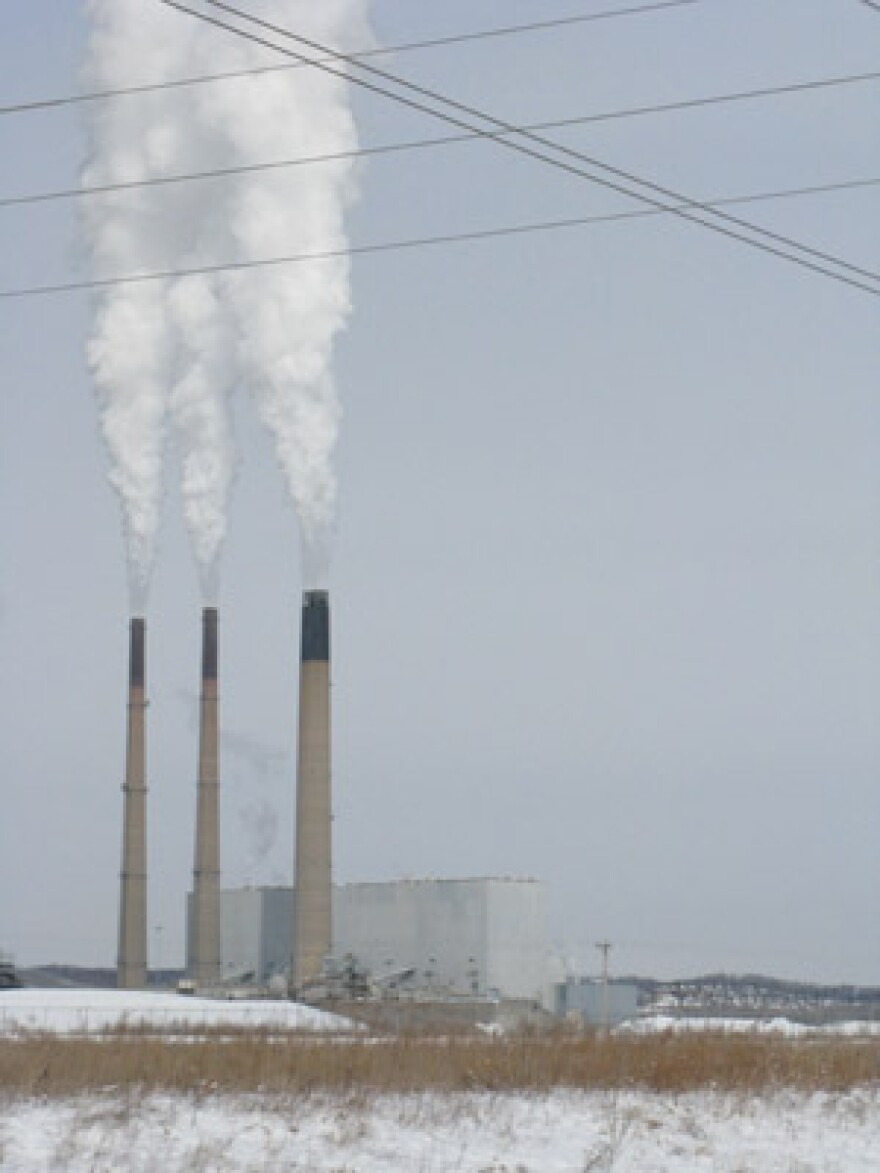http://stream.publicbroadcasting.net/production/mp3/national/local-national-982565.mp3
Labadie, Mo. is a town about 35 miles from St. Louis that might be described as “quaint” and “quiet.” But for the past two years, a controversy between some town residents and Ameren Missouri, an electric company that has a power plant situated in the Missouri River bottoms near Labadie, has sparked a lively local discourse. It concerns the ash that’s leftover from burning coal at the plant. Johanna Mayer has this report.
Big business in a small town
It’s Wednesday morning at the Labadie Market, and the breakfast rush is just ending. A couple of stragglers are talking over coffee at the little round tables scattered throughout the store. Behind them are more than 55 black and white framed photos of the Market’s regular customers. Homemade sauces are for sale. The deli menu boasts sandwiches called the "Bottoms Buster," named after the Missouri river bottoms, and the "Ameren Stack," after the company located a few miles outside town.
This kind of atmosphere of discussion and relaxation is exactly what the Market’s co-owner, Lisa Venezia, envisioned for the store.
“This is a market, it’s a delicatessen, it’s a coffee shop,” Venezia said. “People gather here. They come here to eat, and they come to talk. And I believe in open discourse. I am not going to censor anybody.”
For about two years, a local debate has been cropping up in discussions at the Market, concerning the Ameren power plant that is the sandwich’s namesake. Every year, half a million tons of ash are leftover from burning the coal at the plant, and Ameren recycles half of that. The rest has been going in ponds right next to the plant, but Ameren says those ponds are filling up—fast.
So the company bought some land next to the current ponds, with plans to build a 400-acre landfill. Ameren says the proposed landfill would be safer than the ponds. It would be double- lined to prevent toxins from seeping out, and would have a berm approximately the height of a two-story building to keep out floodwaters. It would also include a system that would send any water that percolated through the liners back to the plant.
Local reaction and participation
Plenty of Franklin County residents are opposed to the landfill, which surprises Greg Gurnow, an Electric Engineer at the Labadie Power Plant. He is also a Labadie resident.
“If it’s simply a safety issue, then why would they be OK with it being in somebody else’s backyard? And I think this is more about a NIMBY (Not In My Backyard) type of scenario than it is anything else,” Gurnow said.
Some of the opponents have formed a group called the Labadie Environmental Organization, or LEO. To them, the issue goes far deeper than NIMBY. Some of the group’s main concerns with the proposed landfill are potentially cancer-causing toxic elements in the ash, like lead and arsenic, possible groundwater pollution, and increased local traffic, both from building the landfill, and from hauling waste from other plants to the Labadie landfill. But LEO’s President, Patricia Schuba, says LEO is as much a community group as an environmental group, and they hope to bring the community together through discussion.
“For a very long time we’ve been separated from participation; it’s been discouraged,” Schuba said. “And actually, you know, people talk badly about participation. Like, ‘why do you worry about that? Don’t you have another job, don’t you have your kids to worry about?’ But this is how we live our lives. So if we disengage, that’s how we get plants putting toxic waste in a floodplain.”
Personally affected
Here is where the Labadie Market comes back into the picture. Venezia allowed a TV newscaster to interview a LEO member inside her store. She says an offer was extended to an Ameren representative as well, but they never took it up. After the interview, a plant manager at the time recommended a boycott of the Market, and employees were forbidden to use the corporate credit card for catered events. The boycott lasted four months, and Venezia’s business took a hit.
“We survived it,” Venezia said. “When I initially realized what was taking place…I was upset. I honestly didn’t feel I had done anything wrong. “
That was in 2010, and Venezia has since restored her good relationship with Ameren. But some people’s concerns go back a little farther.
Emmett Becker is an “old timer.” He’s lived in Labadie nearly his entire life. His father’s land was condemned to build the power plant itself.
“I thought it was kind of a sneaky way to do it,” Becker said. “But I guess that’s big business, just like this landfill.”
Striking a balance
Greg Gurnow says he tries to strike a balance between being a Labadie resident and Ameren employee by looking at the situation as a consumer.
“Well, I’ve noticed this argument isn’t always about the facts. So I’ve chosen to try to educate people around me, and sometimes that puts me in a complicated position with my neighbors,” Gurnow said. “I find the fear mongering is frustrating. We need to take the emotion out of this topic so that the residents truly understand the options at hand.”
Gurnow says the proposal is cost effective, and keeps things local. If the storage facility were moved farther away, transportation costs could increase.
Nancy Campbell is a Labadie resident.
“From a business standpoint, you have to look at this and say, ‘that makes sense,’” Campbell said. “But from an environmental standpoint, of course it doesn’t. And as a good neighbor, it doesn’t either.”
Both sides will have to wait to get a resolution to the debate. Currently, landfills are not addressed in Franklin County regulations. The County is in the process of drafting a zoning change and new regulations.
Some reporting by Veronique LaCapra was used in this report.



